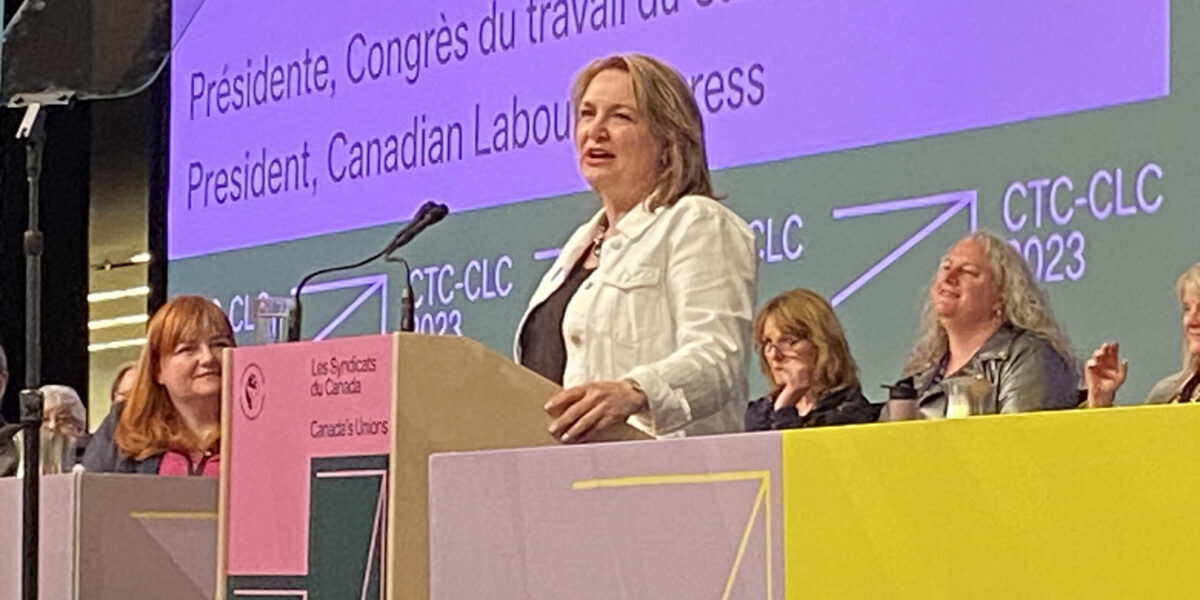As workers filed into the Canadian Labour Congress (CLC) convention space in Montreal’s Palais des Congrès on Monday, May 8, affordability, the rising cost of living, and its effects on workers, is top of mind for many.
The task ahead for the labour movement extends beyond advocating for better public services and higher wages, according to speakers at the convention. As many unions begin to see wins in their collective agreements, they must also prepare to fight rhetoric that blames workers for the rising cost of living.
“Workers are being made to pay for an inflation crisis they did not create,” said Bea Bruske, president of the CLC at this morning’s presidential address.
A panel discussion further unpacked the anti-union narratives surrounding inflation and affordability. The panel included Jim Stanford, economist at the Centre for Future Work, Angella MacEwen, Senior Economist at CUPE National and Armine Yalnizyan, economist at the Atkinson Foundation.
“The biggest myth of all on inflation is the idea that it’s workers’ fault. It’s this idea that wages are growing too fast, and workers are demanding too much,” said Stanford.
READ MORE: 2023 federal budget falls short for unions
Stanford showed great disdain for the theory that workers caused inflation, as convention attendees cheered him on.
“It wasn’t the workers at Loblaws who set the prices for everything you have to buy,” Stanford added, “it was Galen Weston who set those prices. Well, it wasn’t Galen Weston himself but it was Galen Weston’s managers who set the prices.”
Stanford addressed the so-called “wage price spiral” which is often used to justify low wage offers tabled during collective bargaining. Stanford said, however, that the reality behind inflation is a profit-price spiral.
Angella MacEwen, another speaker in the panel discussion, pointed to stagnated wages as evidence that the current levels of inflation are not being caused by rising wages.
“The Bank of Canada and employers have been blaming workers for inflation, even as average pay has been below inflation,” MacEwen explained. “Average wages have been going up by four per cent while inflation has gone up by eight per cent, and they’re saying it’s our fault.”
“There’s a set of ideas out there that are meant to keep workers from asking for what we deserve,” MacEwen added. “Those myths are put forward by some pretty powerful interests, our institutions, like the Bank of Canada, are actually structured to uphold those myths. Unions are one of the most important and really one of the strongest ways that we can push back against those myths.”
On Monday, the Canadian Labour Congress (CLC) tabled an affordability action plan which was passed by a large majority.
The action plan passed by the CLC will not be publicly available until after the convention closes. However, as delegates debated the strengths and weaknesses of the plan, which included items on rent control, public services, and public healthcare.
Beyond fighting narratives that place the blame of inflation on workers, this political work can be used to build momentum for more radical change, according to Armine Yalnizyan.
“Yeah, we need more money. Yes, we need to catch up and we need to be paid our true value and we need better benefits,” Yalnizyan said. “But the best benefits are portable benefits. The more we broaden the benefits to be universal to everybody, the more everybody wins. It’s the gift we give one another in society.
The 30th CLC constitutional convention is taking place in Montreal, QC, from May 8 to May 12.



